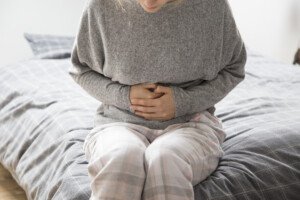It is suspected by some women with microscopic colitis that estrogen might somehow be involved with this uncommon inflammatory bowel disease.
Microscopic colitis, a benign though potentially disruptive condition, often shows up for the first time in a woman’s 40s or 50s – and this age range is associated with premenopause, menopause and soon after menopause.
I developed my first flare-up of microscopic colitis at 47.
Keep in mind that some people with microscopic colitis are men.
Diagnosis is confirmed only from a microscopic sample of large-colon tissue that’s extracted during a colonoscopy, though symptoms can be very suggestive of this condition.
- Sudden-onset of watery or “explosive” non-bloody diarrhea. Its signature feature is that it splatters the interior of the toilet bowl, though other times it may be less liquidy and not do this.
- Low abdominal cramping that’s relieved with the diarrhea.
- A small percentage of patients have transient, non-degenerative joint aches.
Microscopic colitis is often misdiagnosed as irritable bowel syndrome, but without a colonoscopy, microscopic colitis simply should not be given as a diagnosis.
There are two types of MC: lymphocytic and collagenous.
They cause the same symptoms (primarily liquidy or watery diarrhea that often comes with only momentary notice).
A study was done to see if estrogen levels differed in these two types of microscopic colitis and in women without MC.
A questionnaire was given out asking about age at first childbirth, age of first menstruation and of menopause, use of oral contraceptives and hormone replacement therapy.
Study Results
Women who had lymphocytic colitis were more likely to have fewer kids than those with collagenous colitis.
It didn’t matter, however, whether their MC was persistent or sporadic.
Compared with women without MC, patients were less likely to be older than 15 at the time of their first period, and were more likely to go through menopause at a younger age.
Based on this data, the study authors concluded that there is no link between estrogen and microscopic colitis.
The full report is in Drug Target Insights (Oct. 2013).






































